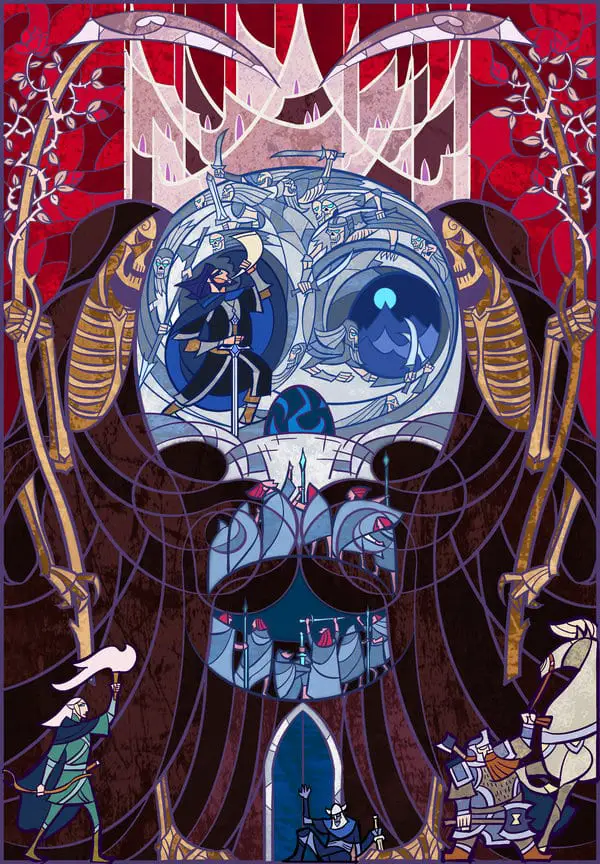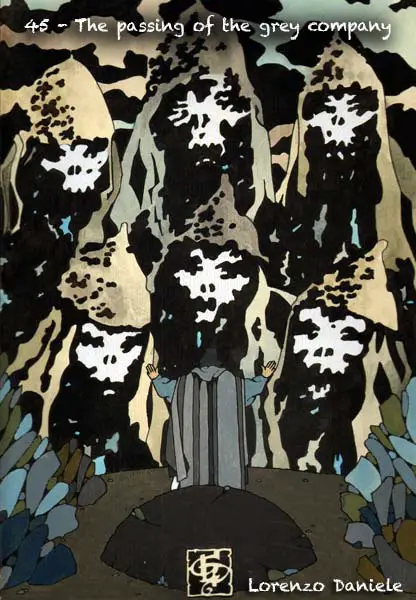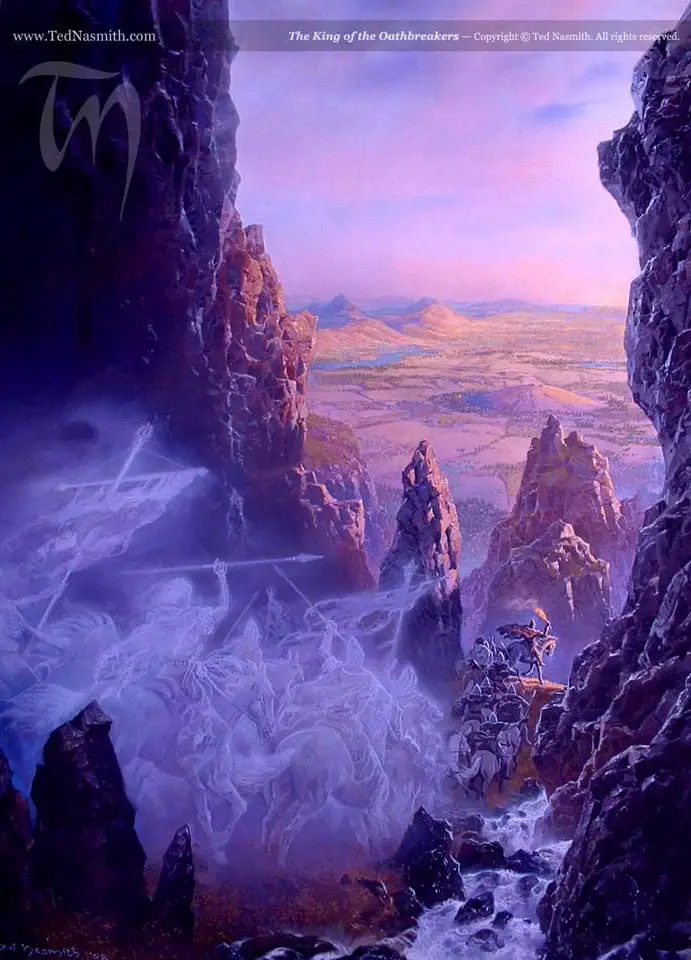“The Passing of the Grey Company,” for better or worse, is a bit of a grab-bag of a chapter. It jumps between three different viewpoints, lays the groundwork for multiple story lines, and feels a bit ramshackle in the process. It’s a chapter that’s largely about Aragorn but opens with a focus on Merry (who disappears after the chapter’s first third). Aragorn does so much in this chapter that by the end, when he’s leading a ghost army on the Paths of the Dead past a giant Númenorean stone embedded in the ground, you’ve forgotten that he had an off-screen mental showdown with Sauron fifteen pages ago. And oh, yeah: Aragorn’s high school best friends show up and Eowyn, making her triumphant return, gets some of the best dialogue yet in The Lord of the Rings. There’s a lot going on.
In that sense, chapter two of The Return of the King is a substantial shift from the personal, intimate focus on Pippin in “Minas Tirith.” And I did miss that chapter’s clear cohesion. But there are so many good moments in “The Passing of the Grey Company.” And despite the flurry events, the chapter holds onto a nice thematic through-line: the continuing tension and overlap between duty and desire.
Merry, Théoden, and Lordship
Despite its differences, “The Passing of the Grey Company” begins in parallel with “Minas Tirith.” In both, we have a lonely hobbit, stripped of his best friend and feeling adrift, making a split-second decision to swear fealty before an impending war. Merry’s decision to enter into Théoden’s service is a bit more comforting than Pippin’s. For one, we know Théoden already, and have reason to trust him. Even more so, the relationship established is one that works both ways. Merry spends the first few pages of the chapter fretting about his uselessness. Almost immediately he begs for Aragorn not to leave him behind, despite the fact that he doesn’t know what he can contribute and that he feels like “baggage to be called for when all is over.”
But as soon as Merry appears before Théoden, his fears are put to rest. Almost as soon as he appears, Merry is told that a pony has been prepared for him, and that he shall ride beside the king as his squire. There’s no reason that Théoden has to do this. He has plenty of people who could serve him, and he’s known Merry for about twenty-four hours. But the fact that he would provide Merry with duty and meaning in a time when he deeply desires them shows a thoughtfulness in Théoden that’s really endearing.
It’s also an effective mirror back onto Denethor and his attitude towards Pippin. Where Merry’s fealty was prompted by a sudden “love for this old man,” Pippin’s was prodded by his “pride” in reaction to Denethor’s “scorn and suspicion.” Where Théoden puts his hand on Merry’s head and blesses him (and accepts with qualifications his role as Merry’s new dad), Denethor smiled “like the cold gleam of the sun on a winter’s evening” and recited a traditional oath.
There’s a mutuality in the relationship established between Merry and Théoden that’s absent in the relationship between Pippin and Denethor (despite the superficial reciprocity of their oaths). One bond feels personal, the other institutional. It’s another glimpse, in Tolkien’s moral universe, at the failures of Denethor. Beyond his failings in the eyes of Gandalf, Denethor is also simply a bad lord. His gnawing cynicism and growing despair make him unable to provide his half of the deal in a manner like the “good” lord, Théoden.

Aragorn, Strider, and the Paths of the Dead
While Théoden is modeling kingly duties as he rides off to the Muster of Rohan, Aragorn finds himself, suddenly and abruptly, at a personal crossroads (with the preferred road leading to dead ghost traitors). Despite his rather regal bearing, Aragorn has rarely found himself in a position of lordship in The Lord of the Rings. When he left Rivendell with the Fellowship, he generally deferred to Gandalf’s wisdom. After Gandalf’s Balrog vacation, he spent much of his time fretting in indecision and keeping his eyes set on small, short-term goals: get to Lothlórien, rescue Merry and Pippin. After Gandalf’s return, Aragorn once again fell in behind him. Thus it’s fitting that as soon as Gandalf is out of the picture, and as soon as Merry and Pippin are safely established in new roles, Aragorn’s past literally catches up with him and points him towards the Paths of the Dead.
Contextually, most characters in The Lord of the Rings see Aragorn as a kind of pseudo-Gandalf. Not explicitly, of course. But they see him as god-sent helper in their own missions. He’s the one to lead the desperate hobbits out of Bree, Black Riders on their tail. He’s the one to step forward and lead the Fellowship after Gandalf’s apparent demise. And he’s the one to aid Théoden in the defense of Helm’s Deep. Everyone assumes that he will continue in that role. That he’ll march off to the muster with Théoden, that he’ll fight alongside Éomer at Minas Tirith. It’s what he’s always done, as long as they’ve known him. But Aragorn’s words to Gimli could be said to any of them: “You forget to whom you speak.”
The line between Strider and Aragorn has always been fuzzy and fine. The reader and the other characters are usually aware that Aragorn is Isildur’s heir, but it’s easy to go a long time without thinking much about it. His long stint as a Ranger means that Aragorn easily slips into the role in which he’s needed (giving a depth to his later admission that few may spend their life as they choose with anything approaching honor). And it’s easy to forget that he’s anything else.
Because of this, it’s fitting that the people of his past—Halbarad and the other Rangers, Elladan, Elrohir, and Arwen through her standard—are the ones who come and reorient Aragorn. It’s also fitting that he does this by taking the Paths of the Dead. It’s reaching a bit, but it’s hard for me not to notice that Aragorn striking out on his own towards Minas Tirith involves him plunging into death and coming out the other side in a kind of quick-by-necessity character rebirth. It’s a fitting turning point for Aragorn’s character. As someone who had previously fretted so much about his choices there is a sense of weight to the certainty of his choice here, even in the face of unpleasant odds.

Éowyn and Aragorn
It’s also fitting that when Aragorn does take this step, it’s not portrayed as particularly glorious. He doesn’t get to march into Minas Tirith to cheering crowds. He doesn’t even get a grand sendoff: poor Éowyn has to stand by herself to see them off, as everyone else in Dunharrow hides from the idiots who are marching headlong into Ghost Mountain. Becoming king is dutiful, and not all that fun: Aragorn has to abandon the main battle to march through ghost hell and face off a secondary threat. It’s unpleasant. Leading an army of the dead in a largely-off-screen battle has, uh, a Gothic flair to it. But it’s not particularly the story line you’d hope for if the book was named after you.
And this context makes Aragorn’s conversation with Éowyn so wonderful. Éowyn does love Aragorn after a fashion, I think. But she also kinda wants to be him. He’s everything that she thinks she wants: glory and honor and excellence, and the freedom to make choices that would bring her those things. It’s apparent from the very early bits of their conversation. She refers to herself as being in “exile,” shunted away from the things that she believes define her. And the great thing about Éowyn’s character is how right and how wrong she is at the same time.
Éowyn absolutely over-valorizes military glory. She seems baffled that Aragorn would take his men “of renown and prowess” away from battle and “into the shadows” of the Paths of the Dead. Her eyes shine when she’s told of the fighting at Helm’s Deep. She characterizes her own role as “skulking in the hills” and demeans the work of dry-nurses and serving women in comparison to those who “face peril and battle.” There’s a desperation in Éowyn’s desire for glory that verges on a desire for self-immolation. And Aragorn is right to push back against this tendency, glamorization of battle for battle’s sake, and to remind Éowyn that it’s often more heroic to live for one’s people than to die for them. Even if less songs are written about it.
…But at the same time, Éowyn is also absolutely right that the position offered to her is unfair. Aragorn’s storyline is about the difficulty of choice, Éowyn’s is about it’s absence. Despite the fact that Aragorn is right in some ways, his manner of telling it to Éowyn is fundamentally from a position of privilege. And she doesn’t hesitate to call him out on it.
“Shall I always be chosen?” she said bitterly. “Shall I always be left behind when the Riders depart? To mind the house while they win renown, and find food and beds when they return?”
“A time may come soon,” said he, “when none will return. Then there will be need of valor without renown, for none shall remember the deeds that are done in the last defense of your homes. Yet the deeds will not be less valiant because they are unpraised.”
And she answered: “All your words are but to say: you are a woman, and your part is in the house. But when the men have died in battle and honor, you have leave to be burned in the house, for the men will need it no more. But I am of the House of Eorl and not a serving-woman. I can ride and wield blade, and I do not fear either pain or death.”
“What do you fear, lady?”
“A cage,” she said. “To stay behind bars, until use and old age accept them, and all chance of doing great deeds is gone beyond recall or desire.”
ÉOWYN. My girl. I am so happy that she points out here that duty is different for different people. It is Aragorn’s duty to take the path he’s taking, even if he’d rather be chilling in Rivendell with Arwen. That’s a difficult thing and deserves sympathy. But it’s not the same as Éowyn’s situation, and I’m very happy that the story acknowledges that. As she points out: Aragorn’s duty requires choices, albeit difficult and unpleasant ones. Éowyn’s duty requires her to accept being chosen.
Even her syntax attempts to convey the injustice: she first speaks of herself in the passive voice (“shall I always be chosen”) and later as the recipient of a kind of posthumous command (“when the men have died in battle and honor, you have leave to be burned in the house, for the men will need it no more” [savage]). If Aragorn’s story is about the difficult of becoming something new, Éowyn is a kind of distorted mirror of that. It’s about the psychological pain of being stunted, being kept away from becoming what she believes herself to be. She’s such a wonderful character, more nuanced than I’d remembered her, and I’m very excited to get more.

Final Comments
- I buried the lede, I guess. The Paths of the Dead were in this chapter! It’s never been my favorite part of The Lord of the Rings, and that held true for this read-through. It’s not bad. It just feels so… tonally different from so much of what’s currently happening? This probably makes me The Worst, but I kept thinking that the whole Paths of the Dead section would be better if they weren’t ghosts. ¯\_(ツ)_/¯ TELL ME I’M WRONG.
- That said, Tolkien does have some horror story chops, which doesn’t surprise me. Despite my ambivalence about its role in the story, I did enjoy reading these good, creepy gems:
Nothing assailed the company nor withstood their passage; and yet steadily fear grew on the Dwarf as he went on: most of all because he knew now that there could be no turning back; all the paths behind were thronged by an unseen host that followed in the dark.
[Gimli] was ever hindmost, pursued by a groping horror that seemed always just about to seize him; and rumor came after him like the shadow-sound of many feet. He stumbled on until he was crawling like a beast on the ground and felt that he could endure no more: he must either find an ending and escape or run back in the madness to meet the following fear.
“The Dead are following,” said Legolas. “I see shapes of Men and of horses, and pale banners like shreds of cloud, and spears like winter-thickets on a misty night. The Dead are following.”
- Gimli’s hope that the Dead hadn’t forgotten how to fight “for otherwise I see not why we should trouble them” made me laugh.
- “Come!” said Legolas at last. “Speak and be comforted, and shake off the shadow! What has happened since we came back to this grim place in the grey morning?” I appreciate The Lord of the Rings’ minimal tolerance for brooding / the glorification of men repressing their feelings. Sharing your feelings is pretty much always good in Tolkien’s Middle-earth, which is nice.
- “A little people but of great worth are the Shirefolk,” said Halbarad. “Little do they know of our long labor of the safe-keeping of their borders, and yet I grudge it not.” I am really charmed by the idea of Rangers having a lot of respect for hobbits.
- I like that Aragorn and Éowyn’s conversation falls in and out of an elevated courtly speak depending on how mad Éowyn is.
- Prose Prize: Can’t be anything else, sorry. “All your words are but to say: you are a woman, and your part is in the house. But when the men have died in battle and honor, you have leave to be burned in the house, for the men will need it no more.”
- Contemporary to this chapter: Again, quite a bit. March 3019 is a busy time. Gandalf and Pippin ride to Minas Tirith, reaching it a bit after Aragorn leads the Dead past Erech. Frodo, Sam, and Faramir spend some time at Henneth Annun. Théoden prepares for the Muster of Rohan. Speaking of which:
- Next time: “The Muster of Rohan”

